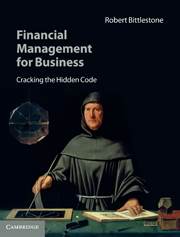Aaker, David A. and Erich, Joachimsthaler 2000. Brand Leadership. London: Simon & Schuster
Bernstein, Peter L. 1996. Against the Gods: The Remarkable Story of Risk. Chichester: John Wiley
Bittlestone, Robert, Diggle, James and Underhill, John 2005. Odysseus Unbound: The Search for Homer's Ithaca. Cambridge University Press
Charan, Ram and Useem, Jerry 2002. ‘Why Companies Fail’. Fortune. 27 May 2002. www.ram-charan.com/articles/Why_Companies_Fail.pdf
Crosby, Alfred W. 1997. The Measure of Reality: Quantification and Western Society, 1250–1600. Cambridge University Press
Dickens, Charles 1850. David Copperfield or the Personal History, Adventures, Experience and Observation of David Copperfield the Younger of Blunderstone Rookery (Which He Never Meant to Publish on Any Account). London: Bradbury & Evans
Drucker, Peter 2007. The Essential Drucker. Oxford: Butterworth-Heinemann
Eccles, Robert G., Herz, Robert H., Keegan, E. Mary and Phillips, David M. H. 2001. The ValueReporting Revolution: Moving Beyond the Earnings Game. Chichester: John Wiley
Forrester, Jay 1968. Principles of Systems. Cambridge, MA: Wright-Allen Press
Fusaro, Peter C. and Miller, Ross M. 2002. What Went Wrong at Enron: Everyone's Guide to the Largest Bankruptcy in U.S. History. Hoboken, NJ: John Wiley
Geijsbeek, John B. and Pacioli, Lucas 1914. Ancient Double-Entry Bookkeeping. Denver, CO: J. B. Geijsbeek
Grier, Elizabeth 1932. ‘Accounting in the Zenon Papyri’, Classical Philology 27(3)
Hallo, William W. 2004. ‘Bookkeeping in the 21st Century BCE’ in Hudson, M. and Wunsch, C.op. cit.
Harding, D. 2004. ‘Parmalat Records Losses of £234m’, Accountancy Age. 8 March 2004
,Harvard Business Review 1998. Harvard Business Review on Measuring Corporate Performance. Cambridge, MA: Harvard Business School Press
Heller, Joseph 1961. Catch-22. New York: Simon & Schuster
Hudson, Michael 2004. ‘Introduction: the Role of Accounting in Civilisation's Economic Takeoff’ in Hudson, M. and Wunsch, C.op. cit.
Hudson, Michael and Wunsch, Cornelia (eds.) 2004. Creating Economic Order: Record-Keeping, Standardization, and the Development of Accounting in the Ancient Near East. Bethesda, MA: CDL Press
Kotler, Phillip, Armstrong, Gary, Wong, Veronica and Saunders, John 2008. Principles of Marketing. Harlow: Pearson Education
Kotruljević, B. 1458. Libro De L'arte De La Mercatura. Venice: Marino de Raphael de Ragusa
Leeson, Nick W. and Whitley, Edward 1996. Rogue Trader. London: Little, Brown
Machiavelli, Niccolò 1532. The Prince. Florence: Antonio Blado d'Asola
Marx, Karl 1867. Das Kapital: Kritik der politischen Ökonomie, trans. Fowkes, B. 1992. Capital, Volume 1: A Critique of Political Economy. London: Penguin
Merloo, Joost 1956. The Rape of the Mind: The Psychology of Thought Control, Menticide, and Brainwashing. New York: Grosset & Dunlap
Muller, Herbert J. 1952. The Uses of the Past. Profiles of Former Societies. Oxford University Press
Nash, J. Madeleine, Voorst, Bruce and Taylor III, Alexander L. 1982. ‘The Growing Bankruptcy Brigade’. Time Magazine. 18 October 1982
Pacioli, L. 1494. Summa De Arithmetica, Geometria, Proportioni et Proportionalita. Venice
Pease, Robert A. 2008. ‘A Comprehensive Study of the Howland Current Pump’. www.national.com/an/AN/AN-1515.pdf
Pisano, Leonardo and Sigler, Laurence E. 2002. Fibonacci's Liber Abaci: A Translation into Modern English of Leonardo Pisano's Book of Calculation. New York: Springer
Rayburn, John 2008. Cat Whiskers and Talking Furniture: A Memoir of Radio and Television. Jefferson, NC: McFarland & Co
Sangster, Alan 2010. ‘Using Accounting History and Luca Pacioli to Put Relevance Back into the Teaching of Double Entry’, Accounting, Business and Financial History 20(1): 23–39
Shakespeare, W. 1598. The Merchant of Venice. London: I. R. for Thomas Heyes
Stipetić, Vladimir 2000. ‘The Legacy of 15th Century Dubrovnik Scholars to Economic Thought’, Zagreb International Review of Economics and Business 3(2)
White, Michael 2000. Leonardo: The First Scientist. London: Little, Brown
Whitehead, Alfred North 1925. Science and the Modern World (the Lowell Lectures). New York: Macmillan
Winters, Nathan B. 2005. Architecture is Elementary: Visual Thinking through Architectural Concepts. Layton, UT: Gibbs Smith
Yamey, Basil S. 1994. ‘Benedikt Kotruljević on Bookkeeping (1458)’, Accounting, Business & Financial History 4(1): 43–50





